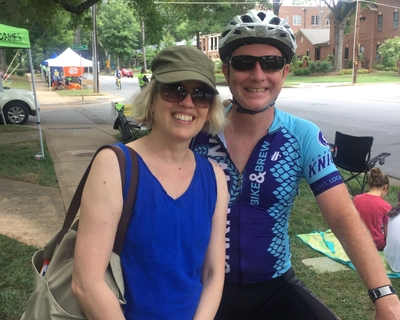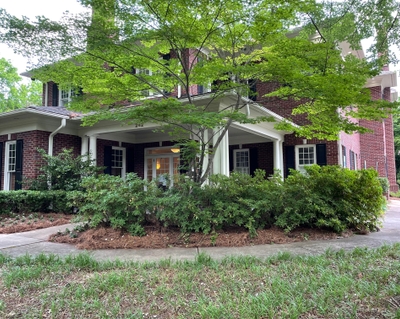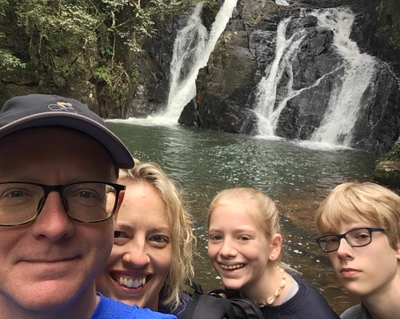Chemotherapy was hard. Every three weeks, the chemicals that slowly killed the tiny clusters of cancer cells invading my left breast also sucked the fluids out of my body, leaving me nauseous, exhausted and suffering a pounding headache. For up to a week after each treatment, I felt like I was walking through quicksand, pulled down by “chemo brain.”
My days were filled with appointments with my doctors, physical therapists and other caregivers. It took all of my energy and concentration to meet my work deadlines on top of getting my son and daughter to and from school and activities, to do the laundry and the grocery shopping, to get dinner on the table.
I knew I had to just keep going. And I did.
But nothing prepared me for what came next. Six months PFC (veterans’ shorthand for post final chemo) was actually so much harder. I fell apart.
We all assume that the hardest part of cancer is the fight, the treatment, the exhaustion, the anxiety. But what I came to discover is that after the cancer is gone … it’s still with you in a way.
What saved me was a diverse lineup of cancer survivorship programs offered by Novant Health.

Done...but not done
A radiologist confirmed my cancer diagnosis after a routine mammogram in late 2017. I was 48 years old. In the years preceding, biopsies of lumps in each of my breasts had proven benign – merely fibroadenomas, harmless tumors commonly found in dense breast tissue. Because of that, the callback for additional screening hadn’t concerned me. Besides, I felt like I was in the best shape I had been in since having kids. I mean, I had just earned my black belt in taekwondo.
But, after looking at the film from my second, more detailed mammogram, the radiologist squeezed my hands and told me she was sorry. That was Dec. 26. After what seemed like daily appointments with different care providers, chemo started Jan. 30, 2018, and repeated every three weeks for six treatments.
I celebrated my last chemo on May 15, 2018, by ringing the bell, wearing my pink Straight Outta Chemo T-shirt and eating lasagna for dinner, one of the only meals that appealed to me at the time. About a month later, my cancer surgeon peeled back the skin covering my chest and removed the underlying tissue that contained the cancer and made up my breasts. (I had opted for the bilateral mastectomy because I never wanted to endure another mammogram – or follow-up.) My plastic surgeon inserted tissue expanders that would hold a place for implants while my incisions healed. My reconstruction was Nov. 1.
Then I was cancer-free. My health care appointments dwindled to once a month or so instead of every week. I had no more chemo treatments to prep for nor side effects to suffer through.
Time to pick up where I left off, right? But, following the intensity of my treatment, I was lost.
My work as a freelance writer, editor and marketer picked up to full speed again after some very understanding clients had allowed me to cut back on my projects during treatment. My role as chief coordinator of my children’s schedules resumed, since my husband didn’t have to step in for my post-chemo and post-surgery recovery periods.
And it all started to wear. I was so used to taking a deep breath every morning and marching from one medical appointment to the next – I knew what I had to do to survive cancer and stay alive, so in a way, it was simple. Without a calendar full of treatment appointments to keep me going and a brain still muddled from long-term chemo side effects, I couldn’t focus my energy or make reasonable goals. I thought I should be “normal” again, but I constantly felt overwhelmed. With two bum shoulders – a side effect of my surgeries – practicing taekwondo, something that brought me joy and a great sense of accomplishment before cancer, just hurt.
Although my response to the end of intensive treatment threw me for a loop, it’s not uncommon for cancer survivors.
“At the end of treatment, the practitioner says, ‘Thank goodness! You've done really well. Come back and see me in three months,’” said Dr. Russell Greenfield, the integrative medicine specialist I saw at the Novant Health Cancer Institute. “That's usually when people who are patients fall apart because you're like, ‘Well, now what do I do?’”
Here’s what helped me find myself again.
Comprehensive cancer care that puts you first
The Cancer Wellness crew
Group therapy has never been my thing, but the Novant Health Cancer Wellness Exercise program provided an instant community of people who understood what I was feeling. And the first three months of the program are free. Twice a week, I joined about a dozen other cancer patients and survivors for guided resistance training and cardio, plus educational sessions on eating healthy foods, how to get better sleep and lowering stress – all important lifestyle habits for keeping cancer at bay.
Those classroom sessions were great places to share and ask questions, and it served as group therapy in disguise. I looked forward to them.
The mastectomy and reconstruction surgeries I underwent that year left me with two frozen shoulders, a painful condition that made it hard to raise my arms above my head. Thanks, cancer! The weekly yoga classes that are part of the exercise program began to open up those joints and brought me some calm.
This program also offers massage for stress relief and one-on-one nutrition counseling that helped me transition out of my sketchy chemo diet as soon as my tastebuds were ready for a variety of delicious foods again.
Talking it out at Buddy Kemp

Though I tried not to cry every time I visited therapist Shannon Crystal at the Novant Health Cancer Institute Buddy Kemp Cancer Support Center, I did. And her message was always simple: Be kind to yourself.
The problem was, I had told myself that I would get back to normal as soon as treatment and surgery were over. Crystal helped me work through the realization that maybe I would have to work up to hourlong, high-energy taekwondo classes again. That maybe I needed time to mourn the loss of not only my breasts but also time I lost during the months I had spent undergoing treatment. That it was OK to abandon my “suck it up, buttercup” approach, step back and give myself some grace to heal physically and emotionally.
And she pushed me to try the tai chi classes at Buddy Kemp, a slow and relaxing form of exercise that fed my love of martial arts without causing pain.
What continues to amaze me about the Buddy Kemp Cancer Support Center is that all of the services are offered for free, a true blessing when you’re paying hundreds or thousands of dollars out of pocket in medical expenses.
The integrative approach
My appointments with Greenfield brought me a similar sense of calm. Like Crystal, he often told me to be kind to myself. For my frozen shoulders, he steered me toward acupuncture (some of the best naps of my life). For my hot flashes, he guided me through a visualization exercise. Chemo knocked me into menopause a few years early and the hormone suppressant I take keeps me there so my cancer doesn’t return. So, when I feel a hot flash coming on, I close my eyes and imagine walking under cold waterfall. It works. I take extra vitamin D on his recommendation, again to stave off cancer.

And for my peace of mind, he suggested a journaling exercise that really makes a difference. For 15 minutes a day, a few times a week, I write nonstop on the same subject or following the same thread. No reviewing or editing until the end of the week. At that point, I can keep what I wrote, delete it from my computer or even tear it out of my journal and burn it. Whichever path I choose, the exercise helps me get my feelings out of my head, where they otherwise can run on an endless loop and muck up my focus.
My Novant Health nurse navigator, who was with me from the very start of my treatment, connected me with all of these amazing resources. (She also offered sanity checks whenever I freaked out about issues such as lymphedema risk and the side effects from maintenance drugs. Pro tip for breast cancer patients: Stick to breastcancer.org when it comes to online research; ignore everything else.)
I’m now more than three years PFC. I’m still cancer-free. And though one of my frozen shoulders keeps hanging on, I just earned my second-degree black belt in taekwondo.
Reminiscing about my cancer journey still makes me cry sometimes, but they’re more tears of relief that it’s all over and that I truly am well – body, mind and spirit.
That’s what happens when you’re kind to yourself.






